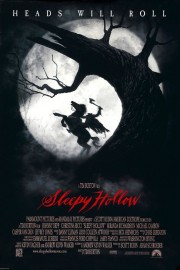Sleepy Hollow
Ahhh…back when the Tim Burton and Johnny Depp collaboration was still exciting and fresh for audiences, and fans of them, as well.
“Sleepy Hollow” is, without a doubt, one of Burton’s best films, up there with “Ed Wood,” “Edward Scissorhands,” “Beetlejuice,” “Sweeney Todd,” and “Big Fish.” It’s also the one, true horror film he’s ever directed, with 2012’s “Dark Shadows” acting as something as an oddball alternative. In “Hollow,” Burton is paying homage to the Gothic tradition of Britain’s Hammer films, which relied on mood, elaborate art direction, and theatrical performances by their actors, namely, Peter Cushing, Christopher Lee, and Michael Gough, the latter two of whom make cameos in this movie. I have a feeling executive producer Francis Ford Coppola was also a fan, if his involvement in this film, and his 1992 “Dracula” adaptation, are any indication. This is the last, great contribution Coppola has made to cinema (thus far), and it’s a thrilling accomplishment.
The story of Sleepy Hollow and the Headless Horseman, as told by Washington Irving, were relative familiar to me growing up, especially with the Disney animated cartoon. But the story is not enough for a feature, which presented a challenge to screenwriter Andrew Kevin Walker (“Se7en”). He met it well with Kevin Yagher, the makeup effects artist (who worked on “Face/Off”) who co-wrote the screen story with Walker. (Tom Stoppard also did a lot of rewrites, though didn’t receive on-screen credit.) They flesh out the Horseman’s story necessarily, and in a way that doesn’t diminish the strength of the terror, or the character of the Horseman himself. They also find a way of portraying Ichabod Crane (a teacher in the original story, here a detective from New York) that gives us a strong character to follow so that the Horseman (played by Christopher Walken in flashback, and Ray Park in his Headless form) isn’t the whole show. That is both a blessing and a curse: Depp is fantastic in the role, playing the character (a modern man of science, not prone to superstition) in the same, idiosyncratic fashion he approached Ed Wood and Edward Scissorhands, but without losing himself in the tics that would mar so many of his more recent performances. On the other hand, the subplot involving his mother (played by Burton’s girlfriend at the time, Lisa Marie) isn’t terribly effective the more one watches.
What is effective, regardless of whether you’re watching for the first time or the fifth time, are the technical values of the film. It starts with the music by Danny Elfman, which sets the tone immediately over the studio logos, and doesn’t relent in very much the same way James Bernard’s scores did for the Hammer films. Elfman’s haunting orchestral strains match the ever-foggy visuals perfectly, as cinematographer Emmanuel Lubezki (“Gravity,” “The Tree of Life”) brings all his gifts in lighting and camera placement in showing off production designer Rick Heinrichs and art director Peter Young’s Oscar-winning sets to their maximum potential. This is a beautiful film to just look at, regardless of whether the expansion of the tale– which includes familial rivalries and question of power in the town –works for you or not. It does for me, but the great thing about a lot of Tim Burton’s films is that, regardless of whether the story is strong or not, you can almost always expect a visually wonderful world to get lost in.
Though not an inexpensive film by any means, I think the thing I like most in watching “Sleepy Hollow” now is that there was no guarantee this film was going to work for audiences the way it did– it was still quirky enough of an effort for both director and star that you felt like they had something to say with it. This was before Johnny Depp became a megastar thanks to the “Pirates of the Caribbean” series, and even though Burton didn’t develop the material initially, this definitely feels like a more personal effort than more questionable remakes like his next film (“Planet of the Apes”), “Charlie and the Chocolate Factory,” and especially 2010’s “Alice in Wonderland,” if only because of the obvious love that comes through for the Hammer films he grew up with. Hopefully, Burton and Depp will find that love of doing something for themselves again, ’cause even though “Sweeney Todd” was a great effort for both, and “Dark Shadows” certainly had its moments (for me, at least), it’s been too long since we’ve seen something this offbeat and invigorating from them that could truly connect with audiences in a way that means something to both filmmakers and fans.










